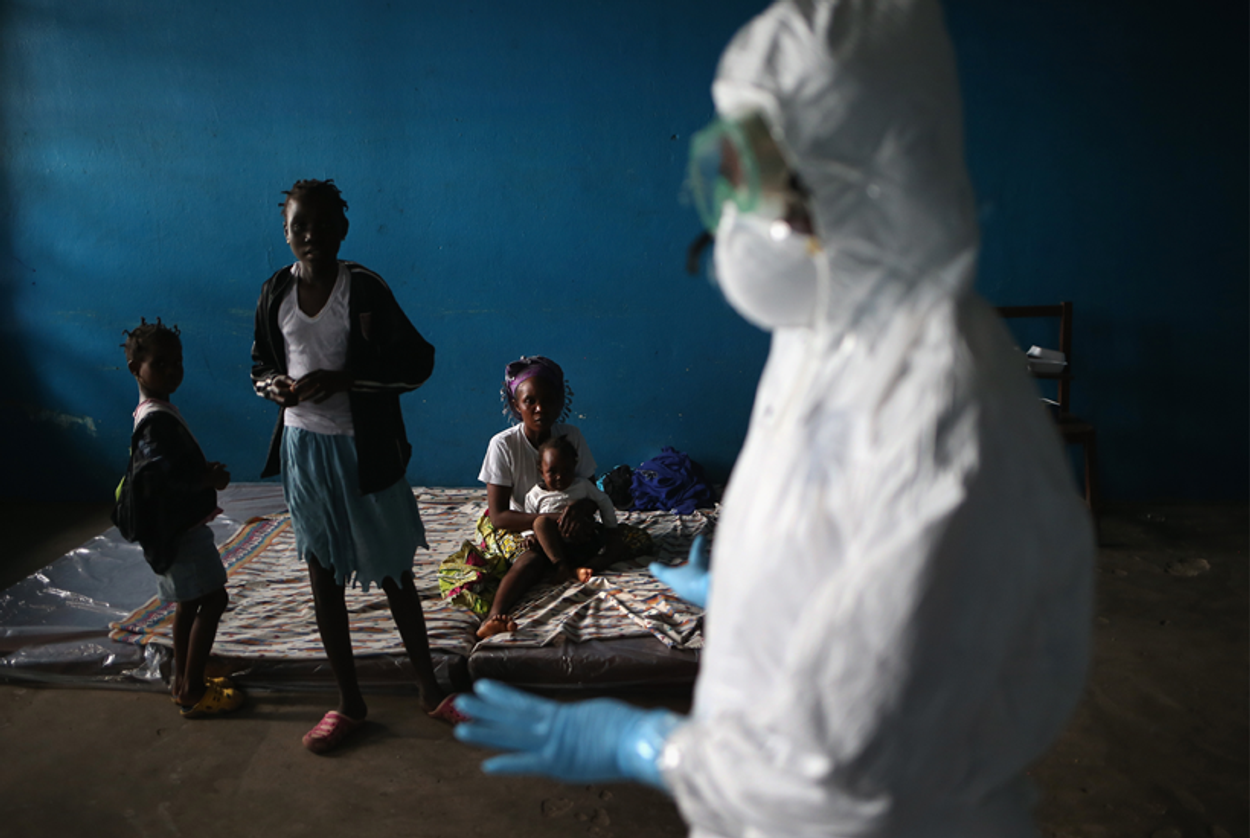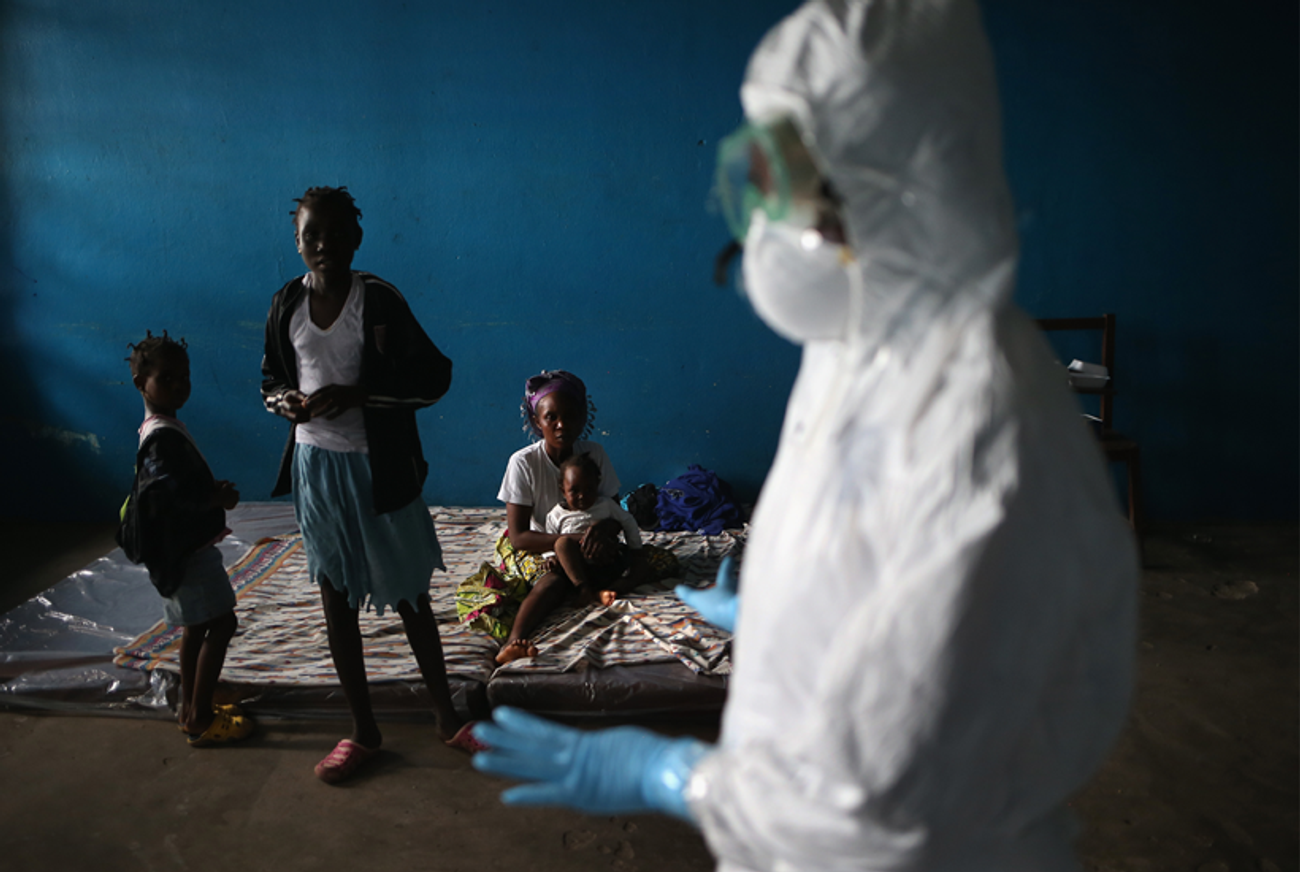Know What’s Scarier—and More of a Threat—Than Ebola? The Racism It’s Fueling.
A hysteria-fueled media paints a continent’s people in grossly stereotypical strokes. Stop us if you’ve heard this one before.




Over the past few years, those with an interest in Africa’s future have sought to overturn what the writer Chimamanda Adichie has termed “the danger of a single story.” Until recently, the single story about Africa, perpetuated mainly through the Western media, had been that of a “dark” continent rife with disease, famine, poverty, and backward attitudes, behaviors, and practices. Yet until the advent of Ebola, a more multifaceted portrayal of modern Africa and its people had been working its way into the mainstream. The world was starting to hear about Africa’s growth and potential, its entrepreneurial and ambitious people, its nations with faster economic growth than any in the West, and the continent’s growing middle class. Unfortunately, the media coverage of Ebola in the past month alone may have taken us back to square one.
This isn’t Ebola’s fault. The virus is, undoubtedly, a scary thing. It has a high fatality rate, is highly infectious (although not highly contagious since it is not an airborne virus). There is currently no cure. It has claimed the lives of thousands of people in Guinea, Liberia, and Sierra Leone in a matter of months. There is also no doubt that the impact of such diseases poses a very real threat to growth and prosperity. None of these facts can be, nor should be, ignored.
However, the media’s handling of the virus, its origins, and its propagation (which some in the media have suggested comes from people eating wildlife, even though this has not been scientifically proven) has reverted to an age-old reliance on lazy stereotypes, generalizations, and misleading information that once again disseminate a view of the African continent’s 1 billion people as wild-animal-eating, jungle-roaming, primitive, disease-carrying “others.” Let’s take for example articles such as one that featured recently in the Washington Post, the headline of which was “Why West Africans keep hunting and eating bush meat despite Ebola concerns.” The reality is that not only do many West Africans not eat bush meat—defined as terrestrial mammals, birds, reptiles, and amphibians harvested for food—but that many Africans in general—whether from south, east, north or west—do not eat bush meat.
Yet, the Washington Post insists that “to many Africans [my emphasis] … bush meat is not only the food of their forefathers, it is life-sustaining protein where nutrition is scarce.” The Washington Post also contrasts Africans’ apparent love of the meat of baboons, chimpanzees, and other wildlife against the “foreign eye” to which bush meat “looks like a flattened, blackened lump of unidentifiable animal parts.” They fail to include the fact that to many Africans, bush meat also looks equally undesirable. If a well-respected media outlet continues to perpetuate such stereotypes and myths, one can only imagine what a regular American thinks about Africans as a result of having been exposed to this kind of coverage.
Articles of this type not only generalize and create a homogenous and monolithic idea of what it is to be African in the 21st century, but posit yet again the average African’s behaviors as primitive and strange, not to mention inferior and absurd. This generalized reporting continues unabated despite the fact there have been—according to the World Health Organization—approximately 4,500 deaths from Ebola: A minuscule portion of the continent’s population.
Although the Ebola virus was first diagnosed as an epidemic in Guinea, Liberia, and Sierra Leone earlier this year it wasn’t until a Liberian medical worker, Thomas Eric Duncan, returned from Liberia to the United States with the virus (and subsequently died) in late September that the level of media interest and coverage given to the virus in America exploded. It is natural that American media is interested in stories that affect American people, and it makes sense that more coverage would have been given to Ebola, an illness that very few people would ever have heard of, when it started to have an impact on America. Yet the high level of media interest does not correspond to the low probability of the average America actually getting the virus.
Given that the virus can only be caught from direct contact with the bodily fluids of an infected person, one would have to know someone with Ebola and to have spent time touching or treating that person in close quarters to fall ill. Realistically, Americans have more chance of contracting the flu—which kills some 36,000 Americans every year and results in more than 200,000 hospitalizations—than they do of contracting Ebola.
Yet this has not stopped growing panic and hysteria, which is being fueled by ongoing sensationalism, not only about Ebola itself, but about Africa and African people. It is one thing to talk about the disease, but quite another to stereotype an entire continent. The media gives the impression, however, through its coverage of Ebola, that Africa is just one country—rather than 55 separate and distinct ones—and that all Africans are the same, living in the same kinds of conditions and circumstances. Indeed, the very description of Ebola as affecting “West Africa” is inaccurate, since West Africa is made up of 17 nations, only three of which—Liberia, Guinea, and Sierra Leone, with a combined population of 22 million—have been seriously affected by Ebola. Both Nigeria and Senegal, which experienced a handful of Ebola cases, are likely to be declared Ebola-free by the World Health Organization in the coming days.
While President Barack Obama has urged people to stay calm, statements from politicians such as Rep. Tim Murphy, a Tennessee Republican who supports a travel ban on all people from West African nations, do not help. He likens Ebola—and perhaps by extension Africans themselves—to a foreign terrorist threat that could destroy America. This is unhelpful and prejudiced language.
Such fear-mongering may be why over the past month there have been a growing number of reported cases of what can only be described as Ebola-fueled discrimination. While it is to be expected that there might be a profound downturn in tourism and business in countries affected by the outbreak, Africans in the United States are reporting discrimination and prejudice. Navarro College in Dallas has started rejecting African students for its Spring 2015 entry on the basis that they may come from countries with confirmed Ebola cases. Liberians in America have taken to Twitter to encourage people not to stereotype them. West African soccer players are being excluded from playing in international games. I myself overheard a man on a bus in New York City ask his friend if he “had been around any Africans lately?” when his friend complained about suffering from cold-like symptoms.
Zeid Ra’ad Al Hussein, the U.N. High Commissioner for Human Rights, recently warned against discrimination against Africans arising as a result of the Ebola coverage, saying, “We must also beware of ‘us’ and ‘them,’ a mentality that locks people into rigid identity groups and reduces all Africans—or all West Africans, or some smaller, national or local group—to a stereotype.” He is right. There’s enough mindless and toxic discrimination in the world as it is. Ebola shouldn’t be used as an excuse for more.
***
You can help support Tablet’s unique brand of Jewish journalism. Click here to donate today.
Lola Adesioye is a British-Nigerian writer and commentator. Her work has been published in The Guardian, The Economist, The Times of London and many more international publications.
Lola Adesioye is a British Nigerian writer and commentator. Her work has been published in The Guardian, The Economist, The Times of London and many more international publications.